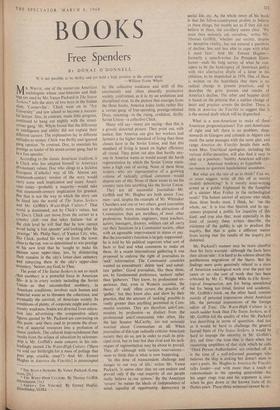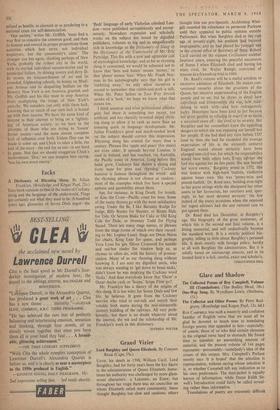BOOKS
Free Spenders
BY DONAT O'DONNELL
'It is not possible to be thrifty and yet hold a high position in the corner gang.' —William Foote Whyte.
MR. WHYTE, one of the numerous American sociologists whose case-histories and find- ings are used by Mr. Vance Packard in The Status Seekers,* tells the story of two boys in the Italian slum, 'Cornerville' : 'Chick went on to "Ivy University" and law school to become a success- ful lawyer. Doc, in contrast, made little progress, continued to hang out nightly with the street- corner gang.' Mr. Whyte found that the difference in intelligence and ability did not explain their different careers. The explanation lay in different attitudes to money. Chick was thrifty and ignored gang opinion. 'In contrast, Doc, to maintain his Prestige as leader of his street-corner gang, had to be a free spender.'
According to the classic American tradition, it is Chick who has adapted himself to American (Protestant) values, Doc who clings to a feckless European (Catholic) way of life. Almost any nineteenth-century version of the story would carry some such implication and many Ameri- cans today—probably a majority—would take that nineteenth-century implication for granted. But that is not the way in which the story can be fitted into the world of. The Status Seekers and Mr. Griffith's Waist-High Culture.t That world is dominated, not by Chick's values, but bY Doe's. Chick can move from the corner to a country club—one that takes Italians—but at the club level he will find that he how cannot avoid being 'a free spender' and looking after his prestige.' Mr. Philip Starr, of Yankee City, who, like Chick, pushed his way up from the lower class to the top, was so determined to win prestige at his new level that he 'sought to make his Parents seem upper-class, too, by disinterring their remains in the city's lower-class cemetery and reburying them in the city's upper-class cemetery.' Nearer, my God, to Thee.
The point of The Status Seekers is not so much that snobbery is a powerful force in American life—it is in every society including the Soviet Union—as that uncontrolled snobbery, in American conditions, involves such human and Material waste as to threaten the coherence, and eventually the survival, of American society. In Conditions of plenty, of corporate might and com- munity weakness, brains are diverted from educa- tion into advertising—the comparative salary figures quoted by Mr. Packard are convincing on this point—and there used to promote the diver- sion of material resources into a profusion of status symbols. The cultural impoverishment that results from the eclipse of education by salesman- ship is Mr. Griffith's main concern in his mis- leadingly named The Waist-High Culture. ('Have we sold our birthright for a mess of pottage that goes pop. crackle, snap?') And• Mr. Emmet Hughes in America the Vincible: is preoccupied
* THE STATUS SEEKERS. By Vance Packard. (Long- mans, 21s.) t THE WANE-HIGH CULTURE. By Thomas Griffith. (Hutchinson, 21 s.)
AMERICA Tin: ViNcIBLt. By Emmer Hugfieg. (Doubleday, $3.95.)
by the collective weakness and drift of this enormously and often absurdly productive society, confronted, as it is, by an ambitious and disciplined rival. In the picture that emerges from the three books, America today looks rather like a 'corner-gang' of free-spending, prestige-minded Does, resenting--in the rising, confident, thrifty Soviet Union—a collective Chick.
Many will say—many are saying—that this is a grossly distorted picture. They point out, with justice, that America can give her workers and farmers a far higher standard of living than these classes have in the Soviet Union, and that this standard of living is based on higher efficiency all round. They point out also that hardly any- one in America wants or would accept' the harsh regimentation by which the Soviet Union main- tains a high rate of saving. None of these three writers—who are representative of a growing volume of radically critical comment—would dispute any of this. None of them wants to see his country turn into anything like the Soviet Union.
They are all successful journalists—Mr. Griffith and Mr. Hughes are both senior Time men—and, despite the example of Mr. Whittaker Chambers and one or two others, good journalists are probably more resistant to the attractions of Communism than are members of most other professions. Scientists, engineers, most teachers, actors, managers, doctors, soldiers can all ,carry out their functions in a Communist society, often with an agreeable imprcivement in status or pay. But the journalist's function is largely suppressed : he is told by his political superiors what sort of facts to find and what comments to make on them. At a recent international gathering it was proposed to endorse the right of journalists to 'seek' information. The Communist countries wanted an amendment : delete 'seek' and substi- tute 'gather.' Good journalists, like these three, arc, by fundamental preference, 'seekers' rather than 'gatherers.' They know, by professional ex- perience, that, even in Western societies, the theory of 'seek' often covers the practice of 'gather,' but they know also, and show by their practice, that the amount of 'seeking' possible is vastly greater than anything permitted in Com- munist societies. They are therefore anti-Com- munists by profession—as distinct from the professional anti-Communists who often, like the late Senator McCarthy, are not seriously worried about Communism at all. When journalists of this type radically criticise American society they do so, not in order to exalt its prin- cipal rival, but in fear lest that rival and his tech- niques of regimentation may be about to prevail. They all—although with various reservations— seem to think that is what is now happening.
'In this time of transcendent challenge and danger to our way of life,' writes Mr. Vance Packard, 'it seems clear that we can endure and prevail only if. the vast majority of our people really believe in .our system.' By the 'American 'system' he means the ideals of independence of mind, equality of opportunity, democracy in social life, etc. As the whole tenor of his book is that his fellow-countrymen profess to believe in these things, but mostly act as if they did not believe in them, the corollary seems clear. 'We must then seriously ask ourselves,' writes Mr. Thomas Griffith, 'whether our society, despite its deceptive vitality, has not entered a parabola of decline, less and less able to cope with what it must face.' And Mr. Emmet Hughes— formerly a speech-writer for President Eisen- hower—ends his long survey of what he con- siders to be the bankruptcy of American policy with two alternative drafts of a letter to his children, to be dispatched in 1976. One of these is written on the hypothesis that there is no radical change in present practices, and it describes the grim process and results of America's decline. The other and happier draft is based on the premise that a sudden change of heart and practice arrests the decline. There is little in America the Vincible to suggest that it is the second draft which will be dispatched.
What is a non-American to make of these American prognostications? For anti-Americans of right and left there is no problem; shop- stewards in Glasgow and colonels in Algiers can mark the same passages with the same glee, and range America the Vincible beside their well- worn Mao. Uncritical apologists, including the various dollar-parasites, Will also find it easy to take up a position : 'healthy American self-criti- cism . . . American tendency to hyperbole . . . no reason to question fundamental soundness.'
But what are the rest of us to think? Can we, as some suggest, 'write all this off as merely modish debunking? Is it merely stunt-writing aimed at a public frightened by the footprint of a sinister Man. Friday in the technological sands? The honest answer of anyone who reads these three books must, I think, be : 'on the whole, no.' It is true that Sputnik and its suc- cessors prepared a public . for ,inquiries of this kind:. and true also that, most especially in the kind of society these writers describe, . the existence of the public is apt to produce the inquiry. But that is quite a different matter from saying that the results of the inquiry ,are distorted.
Mr. Packard's manner may 'be more cheerful than his facts warrant—although the facts have their circus side: it is hard to be solemn about the posthumous migrations of the Starrs. But his findings seem quite genuinely related to a mass of American sociological work over the past ten years or" so--the sort of work that has been criticised by Mr. C. Wright Mills in. The Socio- logical. Imagination, not for being sensational but for being too timid, limited and academic. Mr. Griffith's book, on the other hand, consists. mainly of personal impressions about American life, the personal impreSsions of the foreign editor of Time. The Waist-High Culture is a much sadder book than The Status Seekers, as if Mr. Griffith felt the quality of what Mr. Packard was describing in terms of quantities. And just as it would be hard to challenge the general factual basis of The Status Seekers, it would he hard to impugn the sincerity in Mr. Griffith's . dry, sad tone—the tone that is there when the reassuring amplifiers of that style which he calls 'Third Person Authoritative' are switched off. It 'is the tone of a well-informed passenger who belie'ves the ship is sinking but doesn't want to start a panic. Mr. Hughes in America the Vincible talks louder—and with more than a touch of rodomontade in the opening generalities—but his anger rings true and his argument is close when he gets down to the known facts of the Dulles years. These three witnesses cannot be di', missed as hostile, as alarmist or as pandering to a national craze for self-denunciation.
`Our society,' writes Mr. Griffith, 'must find a way first to conceive the common good, and then to honour and reward in proper proportions those activities which best serve, not individual employers, but the community's aims.' The stranger can but agree, thinking perhaps of New York., probably the richest city in the world, with its myriad individual success-stories and its municipal failure, its shining towers and dirty ill- lit streets, its treasure-houses of art and its crowded, frightening schools, its brains on Madi- son Avenue and its despairing bedlam on the flowery. New York is not America, granted, and Mr. Griffith and his like want to stop America from multiplying the image of New York's anarchy. We outsiders can only wish them luck, knowing that so much of our own luck is bound up with their success. We have the same kind of interest in their attempt to bring on a 'tighten- ing' of American society, as we have in the attempts of those who are trying to 'loosen' Soviet society—and the same almost complete lack of influence over both. Unless Doc can be made to sober up, and Chick to relax a little, the end of the story—the end for us too—is not hard
Mguess. Not that we should exaggerate Chick's alevolence. 'Doc,' we can imagine him saying, *Was his own worst enemy.'



































 Previous page
Previous page